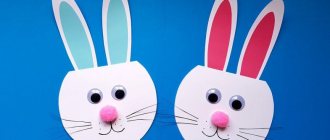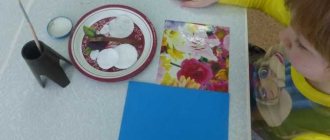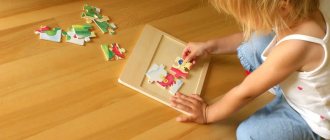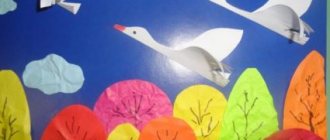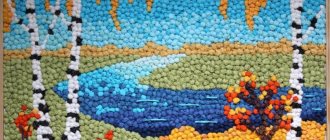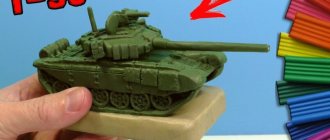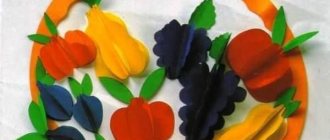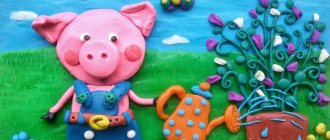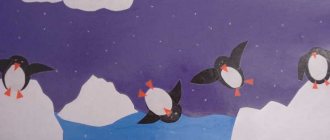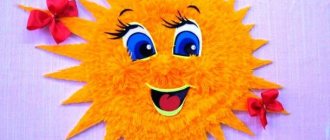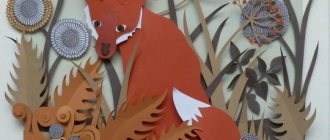Animal applique
Before you start creating, you should talk with your children about the topic of your application. Specify what exactly they want to do: flowers, animals or any item from the office.
Most children choose animals - pets. Many children have their own pets. And therefore it is worth asking them the task of making their pet.
Remember, if you are geographically located in a big city, then these will be cats, dogs, birds, etc. But if this is a rural area, then these could be chickens, cows, geese, ducks.
For the first time, it is worth making one applique - everyone makes one animal. Since the most common one in this case is a cat, it is better to make one.
For little ones, it’s worth making a blank - printing out a cat for bright and colorful appliqués. After which it is worth cutting out individual large parts of the body: the head of the paw, the tail. After gluing it all onto the second sheet, you not only need to cut it out evenly and stick it on the base.
Believe me, no one succeeds the first time, you just have to be patient. Photos of appliques of domestic animals, but also wild ones - from the zoo - can be printed from the Internet or from a website that will not only provide drawings and templates, but also detailed instructions.
You can make the application more complicated. So you can invite children to create their favorite animal from geometric shapes.
- Pre-print colored shapes of different sizes.
- This is necessary so that children not only collect the main elements, but also small ones (nose, eyes, spots on the body).
- This experiment should be carried out with older children.
- For example, children 5-6 years old will do just fine, because they are more diligent and more collected.
Applications for children are not only the development of imagination, but also the realization of oneself as a creative person.
Abstract of GCD on application for children of the preparatory group for school
MDOU "Suslonger kindergarten "Forest Fairy Tale"
Abstract of GCD on application for children of the preparatory group for school
Topic: “Visiting the animals of the north.”
Educational field “Artistic and aesthetic development”.
Compiled by the teacher
Urakova Olga Valentinovna.
Republic of Mari El, Suslonger village
2016
Program content:
-introduce children to a new technique of appliqué using the cutting technique, conveying the effect of a three-dimensional figure;
-develop skills in working with templates (learn to trace a stencil); expand the range of techniques for breaking appliqué (tearing, tearing, plucking);
- develop fine motor skills; develop a sense of form;
— expand children’s ideas about animals living in the north;
-develop memory, attention, thinking;
— consolidate the ability to convey one’s attitude towards animals in stories and productive activities;
— cultivate love and desire to help animals.
Preliminary work:
—
viewing an album with illustrations of wild animals living in different climatic zones;
— artistic creativity: drawing “My favorite animal”;
— reading fiction about animals of the north;
— conversations about the life of wild animals in nature.
Materials:
-stencils of wild animals: polar bear, walrus, deer, cardboard;
- a simple graphite pencil;
-sheets of white, brown, gray paper;
- plasticine;
-glue, scissors, brushes, oilcloths, napkins.
Progress of the lesson:
Educator:
- Guys, today we will go on a trip to the North Pole, where it is very cold and you rarely see anyone. And yet, where there is eternal cold, you can meet animals. But we will try to guess which animals with the help of riddles.
He lives where it is cold, and catches fish from under the ice. He flaunts a white fur coat, knows how to swim and dives. (Polar bear)
The children say: “The polar bear is a wild animal - a predator, lives in the northern regions, on ice floes, and catches sea animals for food: walruses, seals.”
Educator: - What is the name of a bear cub?
Children's answers: - bear cub, - bear cubs.
Educator: - Riddle No. 2
Has two powerful fangs, two flippers and two fins,
But don’t bother this guy, the fat guy lay down to rest... (walrus).
The children say: “The walrus is a sea animal that lives in the north, has large fangs and feeds mainly on mollusks.”
Educator: - Riddle No. 3
He wears his horns like a royal crown,
Eats lichen, green moss, loves snowy meadows. (Deer)
Children say: “Reindeer is a wild animal, but in some areas it is domesticated, it eats moss and lichens.”
Colorful life of a child
In addition to cats, you can make a small dog. The principle of creation is the same. For older kindergarten groups, you can offer to play with colors. Offer the main one, not an ordinary landscape sheet, but colored paper of different colors.
It is much more interesting for a child to work with his favorite colors. Therefore, it is worth taking more bright and calm colors. This way you can get to know the child’s psychotype a little. Psychologists use these techniques.
Color can help connect neural pathways in the brain. When the right color is chosen for a person's problematic object, then that object becomes much easier for the child; the student truly experiences joy in learning.
It was found that children wearing colored glasses who had to take tests on a pegboard performed much faster on the tests when they wore glasses of their favorite color. Color in a child's life is a small joy that pleases their eyes and brain.
Applications made from natural materials
The next type of applique is working with natural materials - grain, wool, and other available materials. Let's make a bear cub. Pre-print the teddy bear, or rather its outline (for the little ones).
- Let the children spread glue without going beyond the contours of the bear, after everything is well coated with glue, you should sprinkle it all with millet, you can try buckwheat, it all depends on the quality of the glue, whether it will withstand heavy cereals.
- Skip the extra bit and see what you can come up with. For older children you can make it more difficult. Print out the bear and ask the kids to cut out the bear. Then stick it on a piece of paper of a different color.
- After the bear sticks to the base and dries, apply glue on top, only on certain areas, paws or tummy, it all depends on your imagination. For older adults, the material can be replaced with cotton wool or sheared artificial wool. You will get a beautiful applique. Remember the safety of the child! After all, every object carries all the danger.
Before you start creating, you should properly arrange your workspace. Prepare absolutely everything so you don’t have to run around the house looking for a pencil or colored paper. The child should be comfortable so that he does not twist or make unnecessary movements.
If you notice that your child is not interested, you should not force him. It’s better to stop, and later talk about what exactly the child didn’t like. This will allow you to keep your child interested in the creative process for a longer time in the future.
Maybe your child doesn’t like working with paper, then you should offer another material, such as fabric. You can also make an excellent applique from fabric, not just on paper. You can invite your child to work with a needle and sew a leather flower onto a fabric base.
- Many parents wonder what to do if their child does not attend kindergarten and they do not have creative thinking. The answer is very simple; templates, stencils and all instructions for working with the application can be found on the Internet.
In this case, you can watch the video and do everything correctly. Take your child and go to the Internet to create applications for every taste. This not only develops the child, but also brings him closer together, because this way you get to know your child more.
Progress of the lesson.
Let's go on a magical journey to the North Pole . To do this, you and I need to create wind and cold (articulation gymnastics, we’ll make our lips into a tube and blow the wind, but our cheeks should not puff up). Guys, look here we are in the North . (Presentation)
. What beauty surrounds us, blue ocean, icebergs, and snowy shores.
Educator: Guys, what animals of the north do you know ? Who wants to make riddles about them. What do you know about them?
The child asks a riddle:
Where are the snowdrifts, cold, ice,
Where the blizzard sweeps snow,
The owner is there in a snowy fur coat.
Walks through the boundless snow.
Children: This is a polar bear. Among the predatory animals of the North , the largest is the polar bear. And his baby is a bear
Educator: Correct. Well done. (show illustration)
The child asks a riddle:
Clever little animal
Lives in the harsh North .
His fur shines like silk,
Like the color of a shiny cover.
Children: This is an arctic fox. He looks like a fox. Arctic foxes come in white and blue.
Educator: Correct. (show illustration)
The child asks a riddle:
Gray chases white
Wants to have a white lunch.
As soon as he catches up, he clicks his teeth:
White - poor, well-fed?
Children: This is a polar wolf. The polar wolf has a warm fur coat, keen eyesight, the ability to hunt and an excellent sense of smell. And his child is a wolf cub. Educator: Correct. Well done. (show illustration)
